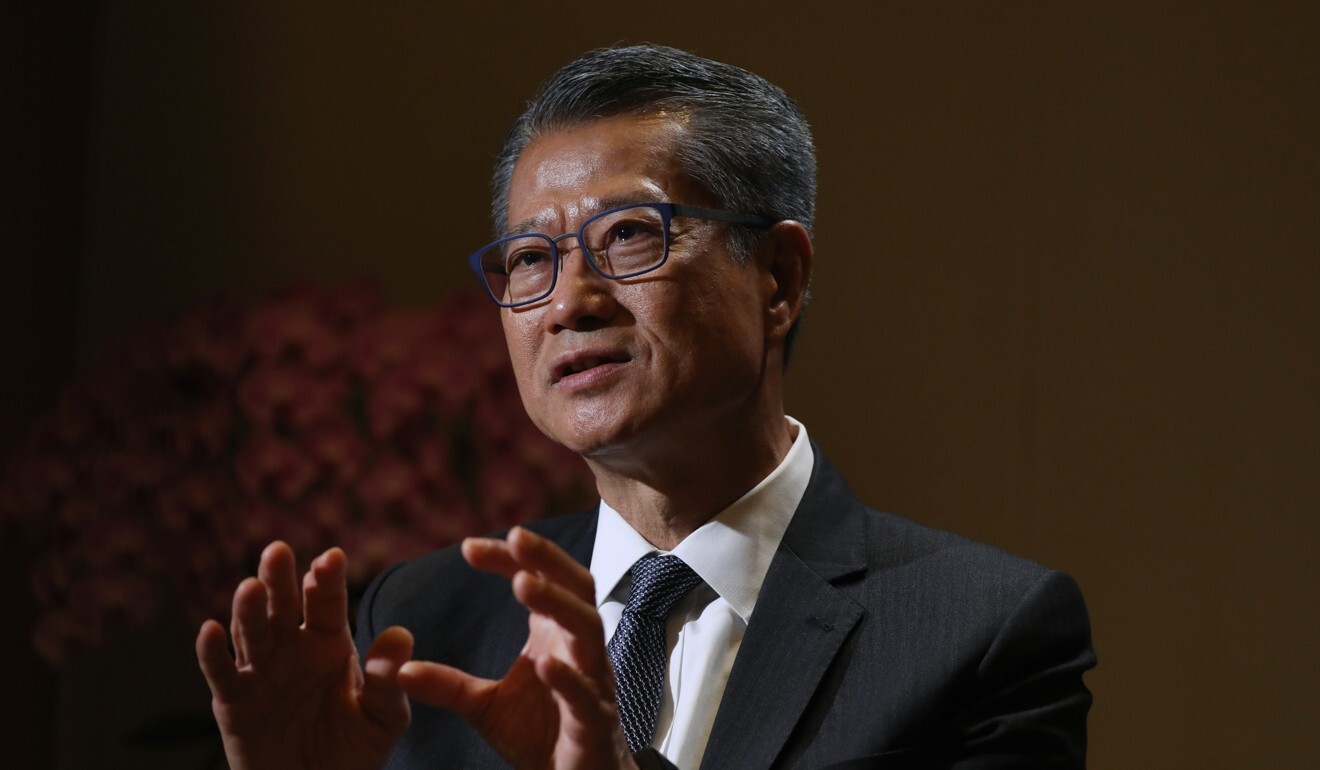
Major threats to Hong Kong economy are under control during coronavirus crisis, Financial Secretary Paul Chan says
- Government on top of risks relating to the currency, bank liquidity and the smooth running of markets, Chan says
- But another minister reveals new welfare claims from the unemployed have surged 151 per cent in a month as Covid-19 pandemic takes its toll
But Financial Secretary Paul Chan Mo-po’s assurances came as another minister said that welfare applications for the unemployed had soared 151 per cent from February to March after the jobless rate hit a record 4.2 per cent.
Writing in his official blog after last week’s currency intervention, Chan said: “In general, although the coronavirus has imposed pressure on economies and financial markets worldwide, including Hong Kong, Hong Kong’s financial risk is still at a controllable level.”

Hong Kong’s currency has been pegged to the US dollar since 1983, and the Hong Kong Monetary Authority (HKMA) is required to keep it trading within 7.75 and 7.85 to the US dollar.
By Thursday it had hit the top end of the scale, forcing the city’s de facto central bank to sell the currency to keep it within the target band on four occasions.
Chan said that showed new capital had been pouring into the city, adding: “The Hong Kong government will continue to maintain the city’s financial stability. This gatekeeping work must be done well to protect national security.”
The government had to manage financial risk in three areas to safeguard the city’s economic security, Chan added. They are to maintain a stable exchange rate, ensure the liquidity of banks, and uphold the orderly operation of financial and asset markets.
The financial chief said he had been working with colleagues at HKMA to ensure there were sufficient Hong Kong and US dollars in the market, adding they had also been trying to make sure that banks had sufficient resources to provide loans to businesses to weather the economic storm.
Hong Kong’s deficit could balloon beyond HK$276.6 billion
Under a scheme unveiled in Chan’s budget in February, the government offers 100 per cent guarantees for loans of up to HK$4 million to small and medium-sized enterprises at low rates of interest.
Since it was launched on Monday, 180 applications have been approved worth a total of more than HK$400 million.
The government has made several interventions to help businesses and residents hit hard by the health crisis, including a HK$137.5 billion package that includes wage subsidies covering up to 50 per cent of workers’ salaries for six months.
Meanwhile, Secretary for Labour and Welfare Law Chi-kwong wrote in his official blog on Sunday that the number of new unemployment-related applications for comprehensive social security assistance (CSSA) scheme had surged from 724 cases in February to 1,821 in March.
The total number of unemployed claiming CSSA reached 14,647 in March, a year-on-year increase of 25 per cent, he added.
A record 51,372 unemployed people accessed the welfare support in September 2003 during the aftermath of the severe acute respiratory syndrome (Sars) outbreak.
‘Despite fresh spending, Hong Kong ready to withstand currency attacks’
Law said the rise was in line with the 4.2 per cent unemployment rate confirmed in the first quarter of this year, which had spiralled because of the US-China trade war, the impact of the anti-government protests triggered in June last year by the now-withdrawn extradition bill and the Covid-19 pandemic. The unemployment rate early last year was 2.8 per cent.
“Most families applying for CSSA due to unemployment just need temporary support from society. They can support themselves once overcoming the difficulties,” Law wrote.
“So at this difficult moment, it’s time for the society to offer cash support to those families in need.”
Law said that since June the government had relaxed the asset cap for CSSA for the unemployed for six months.
Fitch cuts Hong Kong credit rating on ‘virus shock’
He said the asset limit for applicants for a family of four healthy people would be doubled from HK$88,000 to HK$176,000, with self-owned residential properties exempted.
On average, a family of four can get around HK$16,000 of subsidies under CSSA.
“Even though the amount is not high, it’s not that low, as critics have complained,” Law said, adding that the CSSA provided a safety net to families in financial distress.
